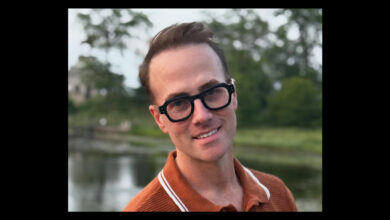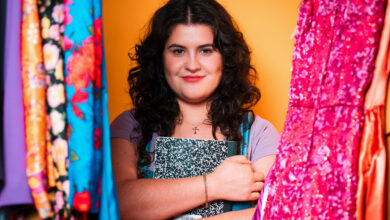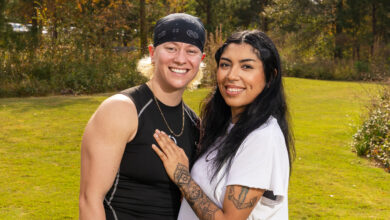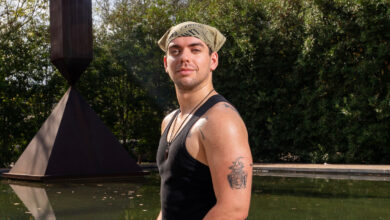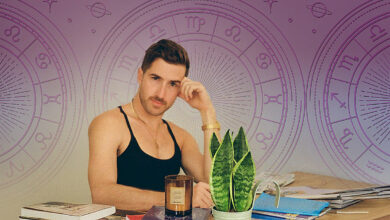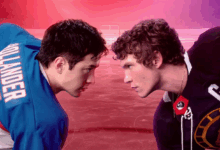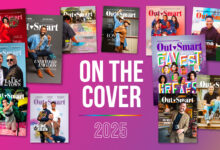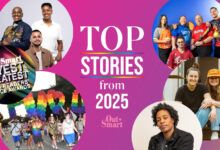
Art, Poetry, and the Stages of Queer Identity
![Museum quality: poet Scott Wiggerman. “We’re going to look at several [poems] that deal with what it’s like to be different—specifically, queer and different.”](http://outsmartmag.wpengine.com/wp-content/uploads/2014/03/Scott.jpg)
Scott Wiggerman offers a writing workshop at the MFAH.
by Neil Ellis Orts
Scott Wiggerman has a long résumé as a poet, poetry publisher, and poetry teacher.
As a poet, he’s published poems in a range of literary journals and magazines, including Southwestern American Literature, Concho River Review, The Texas Observer, and Poetry Midwest. He also has two full-length volumes of poetry to his name, Presence (Pecan Grove Press) and Vegetables and Other Relationships (Plain View Press). Readers of his poems may respond with anything from laughter and tears to arousal, among other emotions.
Wiggerman and his husband, David Meischen, run the nonprofit poetry publishing house Dos Gatos Press. Perhaps best known for the annual Texas Poetry Calendar, Dos Gatos has also published several anthologies and single-poet editions, most recently Lifting the Sky: Southwestern Haiku & Haiga (co-edited by Wiggerman and Constance Campbell) and Letting Myself In by East Texas poet Anne McCrady. This spring, the press will publish its second volume of poetry exercises and instruction, Wingbeats II. The first Wingbeats found success among poets working alone, as well as in college classrooms as a textbook.
On Saturday, March 15, Wiggerman conducts a daylong (9:30 a.m.–4:30 p.m.) writing workshop at MFAH entitled “Sex, Gender, Desire: Exploring Queer Identity through Poetry and Art.” OutSmart talked with him about how the workshop came to be, what a participant might expect in the workshop, and the stages of queer identity.
Neil Ellis Orts: How did this workshop come about? Did you approach them or did they approach you?
Scott Wiggerman: They approached me. It took me by surprise. I got an e-mail first from Pamela Hutchins who is with the Houston Writers Guild, asking if I might be interested. I said yes, and then I got a follow-up from Enos Russell with the Gulf Coast Federation of Writers. Those two organizations are co-sponsoring [the workshop] with the MFAH. They asked me about doing a workshop, and I said [that] I’ve done a lot of workshops, but they’re always poetry workshops; I haven’t really done anything with sexuality. But they seemed to think that was something they wanted done.
So that was their idea.
That was their idea, not mine. I would have been happy just going in and doing a daylong sonnet workshop.
The workshop evolved a little bit. At first, they wanted me to think about writing about authentic GLBT relationships, or something like that. Then they suggested a couple of other things, like did I want to make it a panel discussion? I said no, I’m very comfortable doing workshops, and I think we can work all of that into a workshop, and I don’t mind taking that on. They’ve all been very supportive of the ideas that we’ve hashed out together.
You’re going to be looking at some art. Was that always a part of the proposal?
No, that wasn’t part of it. Initially, [I proposed just doing] a writing workshop. When I found out it was going to be at the Museum of Fine Arts, I asked them if we could add a component, if we’re right there, to focus on art. I do a lot of exercises that deal with ekphrastic writing, and I thought it was a perfect opportunity. It seems a shame to have this world-class museum and not use it. That’s when I started dealing with Jay Heuman. He’s been my contact at the museum, and he said he’d be glad to help out with that portion. So we’re going to do a little tour of some specific art. He’s actually going to introduce the art himself.
Then did he choose the artwork?
I don’t know the museum like he does, and I asked him to give me some suggestions. He sent me a whole list of paintings. He’s the one who [suggested Henry Fuseli’s The Dismission of Adam and Eve from Paradise]. He says that’s where it all starts, as far as he’s concerned, and I said, Okay, we’ll start with that. There were other things I chose, but they were from the list he had given me.
Starting with Adam and Eve, a hetero couple, where does the queering fit in?
We’re also going to be dealing with gender roles, and I think that starts there. Then we’re going to look at Constant Mayer’s Recognition: North and South. It’s really a Civil War painting, but there seems to be such a strong homoerotic aspect to it that I wanted to include that. Then we’re also going to look at a work called Odyssey by Cai Guo-Qiang, which is actually an entire room, and I think it’s an ideal piece to explore the changes in responses to [questions like] What’s male? What’s female? What’s in between?
On the website, describing the program, I said you may leave with more questions than answers. I’m not there to provide you with answers, but I will lead you to a bunch of questions.
So when a participant walks into the MFAH that morning, what can they expect?
They’re going to have a variety of things. First, they will be exposed to a lot of poems that they may or may not be aware of. We’re going to look at specific poems that deal with gender and identity. We’re going to look at several that deal with what it’s like to be different—specifically, queer and different. And then we’re going to end with some at the end of the day about identity and finding that identity and being comfortable with your identity. I have a little slide presentation at the beginning where they’re going to see photos of people and they’re going to have to decide: Male? Female? Trans? I think they’ll find that interesting. Then we’ll also have the tour of the museum [to see] the specific works of art, and in between all these things, we’re going to be doing writing exercises. Right now, I’ve got five different short writing exercises, and at least two of them involve art.
You’re a poet and you do poetry workshops—how would a prose writer fit in?
This is a worry I had, too, when they first approached me. Really, I’m a poet. When I looked at the Houston Writer’s Guild website, it doesn’t look like there’s a lot of poets there. Is this really what they want? But I told them, to me, at least in the last decade or so, the lines have really blurred between poetry and fiction and creative nonfiction. All those lines are blurring. I think it’s going to be okay with everybody, regardless of what genre they write in. I’m not going to require anyone who doesn’t feel comfortable writing poetry to write poetry. I always give options in my workshops for everyone to write whatever they want.
On your website, it says: “The main focus of the workshop will be an exploration of the ‘stages’ the typical GLBTQ person goes through in creating a queer identity as seen through poetry and art.” I would be interested in unpacking the phrase “creating a queer identity.”
At one point in the day, we’re going to look at the so-called models of sexual identity. For instance, the Vivienne Cass model, which was the original one, goes through identity confusion, identity comparison, identity tolerance, and leads up to identity synthesis. So that’s one model we’ll look at. There have been other models, and we’ll look briefly at those as well. We’re also going to look at a poem of mine called “Coming Out,” which goes through five stages, and I think people are going to be familiar with them because I borrowed them from the stages of death and dying from the [Elisabeth] Kübler-Ross book. Starting with denial, anger—I think those are two stages that a lot of people who haven’t moved into a queer identity sometimes get stuck in. I think about some of those right-wing politicians who are so antigay, and I really think some of them are in those stages. And then moving into bargaining, depression, and acceptance. That’s my way of looking at it, but it’s not one of the queer theory models. It’s one I’m going to propose.
I’m already going through my own story and identifying some of those stages.
And that’s what I want to do. At several points throughout the day we’re going to stop and do some writing, exploring our own feelings about these stages and where we’re at and where we might want to go. I mean—and I plan to tell this right at the start—I’m not someone who has a vast knowledge of queer theory. I don’t teach that. It’s not something I normally do in my workshops, but it seemed to fit very well with [this particular workshop].
Other than provoking more questions than answers, do you have other goals for the day? Some workshops say, “You’ll leave with these three points…”
No, I don’t have that. What I usually tell my students is that they’ll come away with several drafts that they can do something with later. I believe in the work part of a workshop, so I always have some kind of writing work. I don’t expect anything to be earth-shattering on the spot, but you can at least leave with ideas for writing projects or a draft that you can rework later.
Neil Ellis Orts is a frequent contributor to OutSmart magazine.


